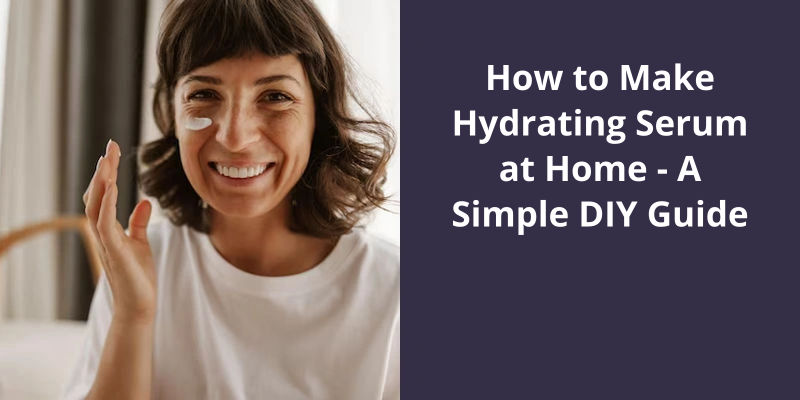Making a hydrating serum at home can be a simple process. First, gather these necessary ingredients which are half a cup of aloe vera gel, a tablespoon of glycerin, and a few drops of your favorite essential oil. Start by adding the aloe vera gel into a clean bowl, followed by glycerin. Aloe vera provides a hydrating base, while the glycerin acts as a great moisturizer. Then, customize your serum by adding a few drops of your chosen essential oil. Essential oils like lavender or tea tree can offer extra benefits like calming or antibacterial properties. Stir the mixture until it becomes homogeneous. After you’re done, store the serum in a glass dropper bottle or jar. You can now use your homemade hydrating serum regularly, ideally twice a day, to keep your skin hydrated and glowing.

What Are Hydrating Serums Made Of?
Hyaluronic acid is a key ingredient in hydrating serums as it’s able to hold up to 1000 times it’s weight in water, making it highly effective for retaining moisture. It’s a natural humectant, which means it draws water into the skin and helps to prevent dehydration. AHAs/BHAs are also effective in hydrating serums as they act as chemical exfoliants, helping to remove dead skin cells and allowing for better penetration of other ingredients.
Niacinamide is a form of vitamin B3 and has been shown to improve the skins barrier function, which aids in preventing moisture loss. It’s also a potent antioxidant, which helps to protect the skin against damage from environmental aggressors. Peptides are another key ingredient in hydrating serums, as they help to stimulate collagen production, which is essential for maintaining skin elasticity and firmness.
Retinol is a derivative of vitamin A and is known for it’s anti-aging benefits. It helps to increase cell turnover, which can improve the texture and tone of the skin. Botanical extracts, such as aloe vera and chamomile, are often included in hydrating serums for their soothing and calming properties. Natural oils, such as argan oil and jojoba oil, are also effective in hydrating serums as they’re able to penetrate the skin quickly and provide long-lasting hydration.
Vitamins, such as vitamin C and vitamin E, are often included in hydrating serums as they’re powerful antioxidants that help to protect the skin against damage from free radicals. These ingredients work together to provide a potent and effective cocktail of hydration and nourishment for the skin. When used regularly, hydrating serums can improve the overall health and appearance of the skin, leaving it looking plump, glowing, and youthful.
Different Types of Hydrating Serums for Different Skin Types (e.g. Oily, Dry, Combination)
This article discusses the various hydrating serums available for different skin types, including oily, dry, and combination skin. It aims to provide readers with information on how to choose the right serum for their specific skin type to achieve optimal hydration.
If you’re looking for a way to improve your skin’s overall health and appearance, making your own vitamin serum could be a great option. By combining vitamin C powder, filtered water, aloe vera gel, and vitamin E oil, you can create a potent and nourishing serum that can brighten, firm, and protect your skin. But before you get started, it’s important to follow the proper instructions and precautions to ensure the best results. Read on for a step-by-step guide on how to make your own vitamin serum at home.
Can I Make Vitamin Serum at Home?
Vitamin serums have become increasingly popular in recent years for their ability to improve skin texture, reduce pigmentation, and boost collagen production. However, with the rising cost of skincare products, many individuals are looking for alternative ways to achieve healthy and radiant skin. One such alternative is to make a vitamin serum at home, using natural ingredients.
To make a vitamin serum at home, you’ll need a few ingredients that you can easily obtain. The primary ingredient is vitamin C powder, which is readily available at any health food store or online. Vitamin E oil, aloe vera gel, and filtered water are also needed. The key to making a successful vitamin serum is selecting high-quality ingredients. Look for brands that are organic, pure, and free of any harmful additives.
Once you’ve gathered all the necessary ingredients, the next step is to mix them. Begin by combining the vitamin C powder and filtered water in a small bowl. Avoid using hot water, as it can degrade the vitamin C. Next, add in the aloe vera gel and vitamin E oil. These ingredients help to soothe and nourish the skin. Mix everything together until thoroughly combined.
Once the serum is mixed, it needs to be stored in an appropriate container. A dark amber bottle is ideal as it helps to prevent oxidation and preserve the serums potency. You can use a funnel to transfer the serum into the bottle. Keep the serum in the fridge to keep it fresh and extend it’s shelf life.
It’s important to note that homemade vitamin serums don’t have the same level of stabilization and shelf life as commercial serum products. The shelf life of this serum may vary depending on the ingredients and storage conditions. Therefore, it’s recommended to make small batches and use them within 1-2 weeks to ensure the serum remains fresh and effective.
Benefits of Vitamin Serums for Skin Health
- Improves skin elasticity
- Reduces fine lines and wrinkles
- Boosts collagen production
- Improves skin texture and tone
- Increases hydration in the skin
- Reduces the appearance of dark spots and hyperpigmentation
- Provides protection against environmental stressors
- Revitalizes dull, tired-looking skin
- Enhances overall skin health
Hyaluronic serum is a great addition to your skincare routine if your skin is seeking hydration and plumpness. It isn’t only easy to make at home but also much more affordable than buying it from the market. By following a few simple steps, you can make a hyaluronic acid serum that’s tailored to your skin’s needs and reap the benefits of hydrated and youthful-looking skin.
How Do You Make Hyaluronic Serum at Home?
Hyaluronic acid is a naturally occurring compound that’s found in the connective tissues of our body. It’s known to help maintain hydration levels in the skin and is a popular ingredient in many skincare products. Making hyaluronic serum at home is a great way to ensure you’re getting pure and potent ingredients and is also a cost-effective option.
The first step is to mix 1/8 teaspoon of hyaluronic acid powder into 2 ounces of distilled water or rose water. It’s essential to use distilled water or rose water to ensure purity and prevent contamination.
Once you’ve added the hyaluronic acid powder, shake the ingredients together vigorously so that the powder dissolves properly. You may need to shake the mixture for a few minutes to ensure that the powder is fully dissolved. The next step is to add 1-4 drops of pure therapeutic essentials such as Neroli or Lavender. This step is optional but can help to enhance the benefits of the serum.
After adding the essential oils, shake the mixture again. Your hyaluronic serum is now ready to use. You can use this serum daily on your face and neck area. Simply apply a few drops of the serum to your skin and massage it in gently. It’s essential to use a moisturizer after applying the serum to lock in the hydration and prevent dryness.
In addition to it’s hydrating properties, hyaluronic acid is also known to have anti-aging benefits. It can help to improve the firmness and elasticity of the skin, reduce the appearance of fine lines and wrinkles, and even out skin tone.
It’s important to note that hyaluronic acid should be used in moderation as it can cause irritation if overused. If you experience any adverse reactions, discontinue use immediately and consult with a dermatologist. Additionally, it’s important to keep the serum in a cool, dry place away from direct sunlight to prevent degradation.
With regular use, you can enjoy the hydrating and anti-aging benefits of this potent ingredient and feel confident in the purity and effectiveness of your skincare routine.
The ingredients used to make serums are diverse and extensive, and they vary significantly depending on the intended benefits and purposes of the serum. From natural extracts to synthetic creations, the use of oils, peptides, vitamins, and acids offers a broad spectrum of options for formulating serums that cater to different skin types and concerns. Let’s explore the key components of serums and their benefits in enhancing your skin’s health and appearance.
What Ingredients Do You Need to Make Serums?
Oils are a key ingredient in serums. Carrier oils such as jojoba, argan, and sweet almond help to deliver other ingredients deeply into the skin, while also providing nourishment and hydration on their own. Oils rich in essential fatty acids, such as rosehip and evening primrose, are also popular choices for their skin-regenerating properties.
Natural extracts are another common ingredient in serums. These can include botanicals such as green tea, chamomile, and aloe vera, as well as fruit and vegetable extracts like tomato and pumpkin. These extracts contain various vitamins, minerals, and antioxidants which help to soothe, brighten, and protect the skin.
Peptides are short chains of amino acids that stimulate collagen production and help to firm and plump the skin. They’re commonly used in anti-aging serums as they can help to reduce the appearance of fine lines and wrinkles. Some popular peptides used in serums include palmitoyl pentapeptide-4 and Matrixyl 3000.
Alpha Hydroxy Acids (AHAs) and Beta Hydroxy Acids (BHAs) are chemical exfoliants that can help to remove dead skin cells and improve skin texture and tone. AHAs are water-soluble and work on the surface of the skin, while BHAs are oil-soluble and penetrate deeper into the pores. Common AHAs used in serums include glycolic and lactic acid, while salicylic acid is a popular BHA.
Ceramides are naturally occurring lipids in the skin that help to strengthen the skins barrier function. In serums, synthetic ceramides are often used to help improve skin hydration and reduce transepidermal water loss. They’re particularly beneficial for those with dry, sensitive, or eczema-prone skin.
Retinoids are derivatives of vitamin A that can help to stimulate collagen production, reduce the appearance of fine lines and wrinkles, and improve skin texture and tone. They’re also effective at treating acne, as they help to regulate oil production in the skin. Popular retinoids used in serums include retinol, retinaldehyde, and adapalene.
In summary, serums can contain a wide variety of ingredients, each chosen for their specific benefits to the skin. Oils, natural extracts, peptides, AHAs, BHAs, ceramides, retinoids, lipids, vitamins, and acids are just some of the ingredients commonly found in serums. When choosing a serum, it’s important to consider your individual skin type and concerns, as well as the purpose of the serum itself.
How to Choose the Right Serum for Different Skin Types
- For Oily Skin: Look for serums that are lightweight, oil-free, and contain ingredients like niacinamide, salicylic acid, and tea tree oil.
- For Dry Skin: Choose a serum that’s hydrating and contains ingredients like hyaluronic acid, glycerin, and vitamin E.
- For Combination Skin: Look for serums that balance oil production and hydration, such as those that contain dimethicone, aloe vera, and chamomile.
- For Sensitive Skin: Choose a serum that’s fragrance-free and contains gentle ingredients like chamomile, aloe vera, and green tea extract.
- For Aging Skin: Look for serums that contain antioxidants, peptides, and retinol to help reduce fine lines and wrinkles.
- For Acne-Prone Skin: Choose a serum that contains ingredients like benzoyl peroxide, salicylic acid, and alpha hydroxy acids to help clear up blemishes.
Many people swear by the benefits of adding vitamin C to their skincare routine, and vitamin C serums have become increasingly popular. While there are many options available for purchase, some individuals may prefer to make their own serum at home. Not only can it be a fun and educational DIY project, but it may also save money in the long run. In this article, we will explore the process of making a vitamin C serum at home and some tips to keep in mind.
Can Vitamin C Serum Be Made at Home?
Vitamin C is an essential nutrient that plays a crucial role in keeping our body healthy and strong. But did you know that this nutrient can also do wonders for your skin? Vitamin C serum is a popular skincare product that can help reduce the appearance of fine lines, wrinkles, and dark spots while promoting a healthy, youthful glow. While there are a number of commercial vitamin C serums available in the market, many people prefer to make their own serum at home.
The primary ingredient required for making your own serum is vitamin C powder, which can be easily found online or at a health food store. These include rose water, vegetable glycerin, and a small mixing bowl.
To make your own vitamin C serum, start by mixing the vitamin powder with some rose water in a small bowl. Stir the mixture well until the powder is completely dissolved. Then, add some vegetable glycerin to the bowl and whisk everything together to create a smooth, homogenous mixture. Once your serum is well mixed, you can store it in a clean, airtight container and refrigerate it for later use.
For instance, you can experiment with different ratios of rose water and glycerin to create a serum that’s more or less hydrating. You can also add other ingredients to the serum, such as vitamin E oil, aloe vera gel, or essential oils, to enhance it’s benefits and scent.
When using your homemade vitamin C serum, it’s important to take some precautions to ensure that it’s safe and effective. First, make sure that your hands and face are clean before applying the serum. Avoid applying the serum around your eyes or mouth, as it can cause irritation. Also, be aware that vitamin C serum can make your skin more sensitive to the sun, so it’s best to use it at night or to follow up with a sunscreen during the day.
By following these simple steps and taking the right precautions, you can create a high-quality serum that will leave your skin looking and feeling it’s very best. So why not give it a try and see the difference it can make for yourself?
The Science Behind Vitamin C Serum for Skincare
Vitamin C serum is a popular skincare product that contains a high concentration of vitamin C, an antioxidant that can help brighten and protect the skin. The science behind it’s effectiveness lies in it’s ability to neutralize free radicals, which can cause damage to the skin and contribute to aging. Vitamin C also helps to boost collagen production and improve the overall tone and texture of the skin. It’s acidic nature can also help improve the absorption of other skincare products applied after the serum.
There are many homemade face serums that you can experiment with to find what works best for your skin type. One easy recipe involves mixing Aloe Vera and Turmeric, while another involves using Coconut Oil and Turmeric for more youthful-looking skin. Keep reading for more tips on creating the perfect homemade serum for radiant skin.
What Is the Best Homemade Face Serum?
Many people nowadays are interested in natural and homemade skincare products. And when it comes to serums, there are few things better for your skin than those made at home. Serums can deliver potent ingredients directly to your skin and help keep it looking healthy and youthful. But with so many options available, it can be tough to know where to start. So, what’s the best homemade face serum?
One great option is a DIY serum made with aloe vera and turmeric. Aloe vera is a natural moisturizer that can help soothe irritated skin, while turmeric has anti-inflammatory properties that can help reduce redness and inflammation. To make this serum, simply mix two tablespoons of aloe vera gel with one tablespoon of turmeric powder. Apply the mixture to your face before bed, and rinse it off in the morning.
If youre worried about the grainy texture that turmeric powder can sometimes have, you can try using turmeric essential oil instead. The turmeric oil will penetrate your skin more easily and provide the same anti-inflammatory benefits as turmeric powder.
Coconut oil is a natural moisturizer that can help keep your skin hydrated and healthy, while turmeric has strong anti-inflammatory and antioxidant properties. To make this serum, simply melt a tablespoon of coconut oil and add a teaspoon of turmeric powder.
For those with oily skin, a DIY serum made with witch hazel and tea tree oil may be a perfect fit. Witch hazel is a natural astringent that can help control oil production and reduce inflammation, while tea tree oil has antibacterial properties that can help fight acne. To make this serum, mix one tablespoon of witch hazel with a few drops of tea tree oil, and apply the mixture to your face in the morning and before bed.
Finally, a homemade serum made with rosehip oil and vitamin E can help keep your skin looking youthful and vibrant. Rosehip oil is rich in antioxidants and essential fatty acids, while vitamin E is a powerful antioxidant that can help protect your skin from damage.
Other Homemade Face Serum Recipes for Different Skin Concerns (e.g., Dry Skin, Anti-Aging, Hyperpigmentation)
- Face Serum Recipe for Dry Skin:
- 2 tbsp rosehip oil
- 2 drops chamomile essential oil
- 2 drops lavender essential oil
- Face Serum Recipe for Anti-Aging:
- 2 tbsp pomegranate seed oil
- 2 drops frankincense essential oil
- 2 drops geranium essential oil
- Face Serum Recipe for Hyperpigmentation:
- 2 tbsp jojoba oil
- 1 tbsp evening primrose oil
- 2 drops lemon essential oil
Source: A guide to homemade natural facial serum – Purplle
Conclusion
In conclusion, making a hydrating serum at home isn’t only easy but also cost-effective. The use of natural ingredients such as aloe vera gel, jojoba oil, and essential oils like lavender, chamomile, or rose ensures that the serum is free from harmful chemicals and is safe for the skin. The vegetable glycerin helps to lock in moisture, keeping the skin hydrated and plump while the vitamin E capsule provides antioxidant benefits. So why not try making your own hydrating serum today and see the difference it can make in your skincare routine!





